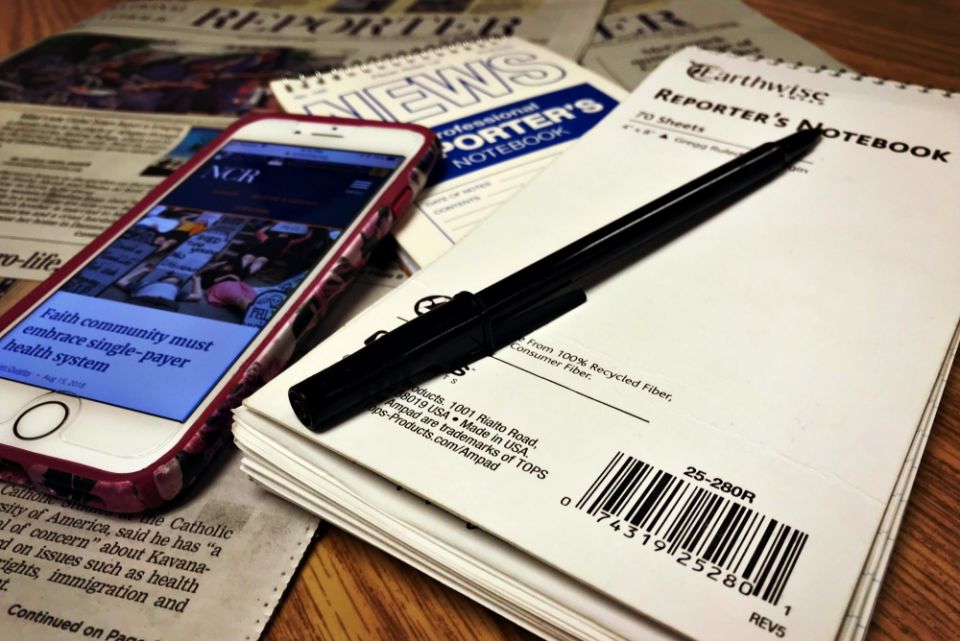A Journalism of Peace: The Media’s Indispensable Social Function
TMS PEACE JOURNALISM, 20 Aug 2018
Editorial – National Catholic Reporter
16 Aug 2018 – Earlier this year, to mark World Communications Day, Pope Francis issued a stern warning against the dangers of “fake news” and an equally firm endorsement of what he called the “journalism for peace.”
“By [journalism of peace], I do not mean the saccharine kind of journalism that refuses to acknowledge the existence of serious problems or smacks of sentimentalism,” Francis wrote. “On the contrary, I mean a journalism that is truthful and opposed to falsehoods, rhetorical slogans, and sensational headlines.”
Journalism must be “at the service of all, especially those — and they are the majority in our world — who have no voice,” Francis wrote.
Journalism of service, he said, explores the underlying causes of conflict so as to contribute to its resolution.
Journalism, he said, should be “committed to pointing out alternatives to the escalation of shouting matches and verbal violence.”
In this message, Francis spoke profoundly to the needs of our times.
Francis’ message also echoes the Jesuit political philosopher whose thinking helped shape the founding of this newspaper: John Courtney Murray.
“Within the church, as within civil society, public information is a social necessity. The press performs a social function and this function is indispensable,” Murray said at a talk delivered just a few months before NCR published its first issue in October 1964. Murray wrote:
The Catholic free press within the church is not some sort of luxury that is really to be frowned on. It is not a nuisance that has to be tolerated. … The church, for all her differences as over against civil society, remains a society. And the societal character of the church creates a public right to information about all that concerns the church. … Through these rights of the people the freedom of the press knows only one limitation, and that is the people’s need to know. And I think within the church, as within civil society, the need of the people to know is in principle unlimited.
Our founding editors’ and Murray’s particular arena was the Catholic Church, but it is easy to see how their beliefs about a free press extend to the wider society. In their inaugural editorial, called “Planks for a platform,” our founders spelled out their intent, saying, “Our orientation, then, is toward reporting the news, toward enterprise and relevance, toward dialogue with practically everybody. … We think this kind of work can be a vocation; one reason it may be our vocation is that we like doing it and think it makes a difference in the world.”
Journalists should press our church and civic leaders “for as much information as can be had about events and their meaning,” which would require, our founders wrote, “the putting of awkward questions and the printing of awkward facts.” We do this not to embarrass or exploit people, but to explain and help the search for solutions — it is our indispensable social function.
To be journalists for peace: That is our duty; that is our vocation. That orientation still informs the work we do some 54 years later.
We don’t usually include prayers to our editorials, but in this case, it seems appropriate to end with a prayer Francis included in his message for World Communications Day:
Lord, make us instruments of your peace.
Help us to recognize the evil latent in a communication that does not build communion.
Help us to remove the venom from our judgements.
Help us to speak about others as our brothers and sisters.
You are faithful and trustworthy; may our words be seeds of goodness for the world:
where there is shouting, let us practice listening;
where there is confusion, let us inspire harmony;
where there is ambiguity, let us bring clarity;
where there is exclusion, let us offer solidarity;
where there is sensationalism, let us use sobriety;
where there is superficiality, let us raise real questions;
where there is prejudice, let us awaken trust;
where there is hostility, let us bring respect;
where there is falsehood, let us bring truth.
Amen.
Go to Original – ncronline.org
DISCLAIMER: The statements, views and opinions expressed in pieces republished here are solely those of the authors and do not necessarily represent those of TMS. In accordance with title 17 U.S.C. section 107, this material is distributed without profit to those who have expressed a prior interest in receiving the included information for research and educational purposes. TMS has no affiliation whatsoever with the originator of this article nor is TMS endorsed or sponsored by the originator. “GO TO ORIGINAL” links are provided as a convenience to our readers and allow for verification of authenticity. However, as originating pages are often updated by their originating host sites, the versions posted may not match the versions our readers view when clicking the “GO TO ORIGINAL” links. This site contains copyrighted material the use of which has not always been specifically authorized by the copyright owner. We are making such material available in our efforts to advance understanding of environmental, political, human rights, economic, democracy, scientific, and social justice issues, etc. We believe this constitutes a ‘fair use’ of any such copyrighted material as provided for in section 107 of the US Copyright Law. In accordance with Title 17 U.S.C. Section 107, the material on this site is distributed without profit to those who have expressed a prior interest in receiving the included information for research and educational purposes. For more information go to: http://www.law.cornell.edu/uscode/17/107.shtml. If you wish to use copyrighted material from this site for purposes of your own that go beyond ‘fair use’, you must obtain permission from the copyright owner.
Read more
Click here to go to the current weekly digest or pick another article:
TMS PEACE JOURNALISM:
